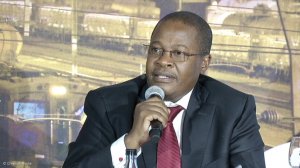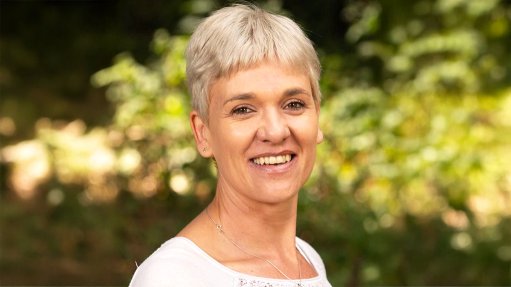Transnet CEO criticises insufficient ‘small guy’ access at RBCT

Transnet group CEO Brian Molefe tells Mining Weekly Online’s Martin Creamer that the company is taking steps to help small emerging coal miners to be able to export their coal. Camerawork: Darlene Creamer; Editing: Shane Williams.
JOHANNESBURG (miningweekly.com) – State rail company Transnet has strongly criticised the alleged insufficient accommodation of small emerging coal miners at South Africa's large private-sector-owned Richards Bay Coal Terminal (RBCT).
In response to Mining Weekly Online after Transnet reported an outstanding 71%-higher interim profit for the six months to September 30, group CEO Brian Molefe came down firmly on the side of “the small guys” and said too few emerging coal juniors were being allowed to put their coal through RBCT into global markets.
RBCT has a capacity of 91-million tons of coal a year, some four-million tons of which has been allocated to black coal miners under its Quattro scheme.
Against the background of many small coal mining companies continuing to enlist Transnet’s help, the State rail company was pressing ahead with its study into using part of its land and port capacity at Richards Bay for allocation to small coal exporters.
“There should be room for the small guys,” Molefe said.
While RBCT was entitled to a fair return on capital, Molefe believed that the terminal owners could be more accommodating, especially given this country’s history.
“We’re not about to do anything extra judicial, which is why I say we are considering building another terminal next door,” Molefe said.
Transnet was not challenging RBCT’s right to decide not to share.
“It’s fine, it’s what they’re entitled to do in terms of the contract. But then we will build something next door and we'll provide rail capacity to the small guys to take their coal next door.
“We are going to respect their existing contract and not do anything outside of the existing contract, but we're just pleading with them for the small guys, and they are saying ‘no’, which they are perfectly entitled to do,” Molefe reiterated.
Earlier he had responded to Mining Weekly Online that the problem with Richards Bay was actually a general problem with concessions.
“What happened there is that a few players in the market got the concession at Richards Bay and now they are refusing to allow the small guys to take their coal through the port.
“That is the problem that confronts us as a nation. Their defence is that they have already allowed enough by allocating about four-million tons in terms of the Quattro scheme and the black economic-empowerment deals they have done through equity.
“All we know is that there are a lot of small guys there that come to us and say can you please go and fight for us as the small guys to get additional allocations through Richards Bay.
“In fact, I had a very disastrous meeting with BHP Billiton early in the week where we nearly came to blows because they are refusing to give up an additional one-million tons for the small guys despite the amount of coal that we are railing and that we are putting through to the terminal.
“That has prompted us to think of using part of the Richards Bay port for the small guys.
“We fight for the small guys. That is the real issue at the bottom of this entire coal hullabaloo.
“There’s no point that Transnet wants freer use of the coal terminal. We don’t export coal but we have said we are aware that smaller guys are saying that they are not able to export coal because they are not allowed into RBCT, which is why we are prepared to put our own capital next door," he said.
The ground on which the RBCT had been built still belonged to the State but there was a lease on that land.
While it would be counter productive to build another coal terminal so close to RBCT, the fact of the matter was that the biggest coal terminal in the southern hemisphere was the preserve of the private sector for the sole pursuit of its own self interest.
“That is the problem if the truth be told. So it is true that we are considering using part of our land and port capacity at Richards Bay to allocate to the small guys.
“However, we remain willing to talk and negotiate about RBCT. It’s an asset that is in fact owned by the Transnet National Port Authority and leased out to the private sector that is now turning away the small guys.”
He had been in discussion with BHP Billiton for the signing of a ten-year agreement already signed by other members of the South African coal-mining industry.
“Our ability to fund operations will depend on the industry’s willingness to sign long-term contracts with us. We’ve been negotiating the BHP Billiton contract for the last three years and BHP has in fact been benefiting from the fact that there have not been tariff increases during that period because we’ve been having month-on-month contracts.
“Now, it's very difficult for us to go and borrow ten-year paper to come and do infrastructure here with month-on-month contracts and that was the reason why we were negotiating,” Molefe explained in response to questions.
As has been reported earlier, the proposed State-owned coal terminal alongside the private-sector-owned RBCT was likely to be project scoped by the end of this year.
RAILED COAL SLIGHTLY HIGHER
Coal line volumes were marginally up at 41.9-million tons in the six months from March to September, with growth being constrained by the longer-than-anticipated project work to increase rail capacity in Ermelo during Transnet’s yearly shutdown of the line for maintenance.
Transnet’s superb set of interims recorded a 14.3% revenue increase to R28.5-billion, a 26% increase in automotive and container volumes and earnings before interest, tax, depreciation and amortisation of 19.3% to R12-billion, up from R10-billion previously.
Profit for the period from March to September increased by 71.2% to R2.9-billion.
Cash generated from operations after working capital changes increased by 15.2% to R11.3-billion.
Capital investment was at R11.2-billion and gearing at 44.7%, with 3.4 times cash interest cover.
Broad-based black economic-empowerment expenditure totalled R19.6-billion.
There was a 12% increase in railed mineral and chrome volumes and a 26% jump in containers and automotive on rail, the latter confirming South Africa’s shift of cargo off roads and on to rail.
The coal line was seeing the benefits of the extra maintenance work, which had improved efficiencies.
The coal line’s Project Shongololo had lifted weekly tempos from an average of 1.4-million tons to 1.8-million tons in the second quarter of the financial year.
Iron-ore and manganese were flat at 31.4-million tons mainly because of lower-than-expected production from iron-ore mines in the Northern Cape.
Transnet is moving 100% of what is made available to it and expects to be slightly above last year’s iron-ore volume for the full year.
There was 9.4% additional container volume at the ports despite teething problems associated with the newly installed tandem lift cranes in Durban.
Petroleum volumes for Transnet’s pipelines unit fell 1.5% as a result of less demand for fuel in Gauteng.
Profitability is up despite a 10.9% increase in operating costs, owing to more expensive fuel, electricity and salaries.
Cost management yielded a R1.4-billion saving.
Of the R11.2-billion capital spent, R5-billion was for the expansion of infrastructure and equipment and R6.2-billion for maintaining capacity.
Major projects include the expansion of the coal line to 81-million tons and the iron-ore line to 60-million tons.
Ten 95 Class 20E electric locomotive for the general freight business will be manufactured and assembled in China and the remaining 85 locomotives assembled at Transnet Engineering’s Koedoespoort plant.
The State shareholder has given Transnet approval to acquire 1 064 diesel and electric locomotives for general freight at a cost of R38.6-billion.
Transnet invested R2.1-billion in the maintenance and overhauling of locomotives and wagons and 1 944 wagons have been built as part of the project to acquire wagons for the parastatal's Market Demand Strategy.
Transnet has started deepening seven steel sheet piled berths at Durban’s Maydon Wharf and construction of the new multiproduct pipeline’s coastal and inland terminals are under way.
To date, Transnet has invested R20-billion on the project since inception and R1.7-billion so far this year.
Funding from diverse sources supports Transnet’s R307.5-billion rolling seven-year investment programme.
In the last six months, Transnet raised R9.4-billion, of which R1-billion was commercial paper issuance; another R1-billion from bank loans; R5.7-billion from domestic bonds; and R1.7-billion from the African Development Bank.
It repaid R3.4-billion, leaving its gearing ratio well below the ceiling of 50%.
It is on track to meet R15.6-billion capital raising for the year.
Article Enquiry
Email Article
Save Article
Feedback
To advertise email advertising@creamermedia.co.za or click here
Comments
Announcements
What's On
Subscribe to improve your user experience...
Option 1 (equivalent of R125 a month):
Receive a weekly copy of Creamer Media's Engineering News & Mining Weekly magazine
(print copy for those in South Africa and e-magazine for those outside of South Africa)
Receive daily email newsletters
Access to full search results
Access archive of magazine back copies
Access to Projects in Progress
Access to ONE Research Report of your choice in PDF format
Option 2 (equivalent of R375 a month):
All benefits from Option 1
PLUS
Access to Creamer Media's Research Channel Africa for ALL Research Reports, in PDF format, on various industrial and mining sectors
including Electricity; Water; Energy Transition; Hydrogen; Roads, Rail and Ports; Coal; Gold; Platinum; Battery Metals; etc.
Already a subscriber?
Forgotten your password?
Receive weekly copy of Creamer Media's Engineering News & Mining Weekly magazine (print copy for those in South Africa and e-magazine for those outside of South Africa)
➕
Recieve daily email newsletters
➕
Access to full search results
➕
Access archive of magazine back copies
➕
Access to Projects in Progress
➕
Access to ONE Research Report of your choice in PDF format
RESEARCH CHANNEL AFRICA
R4500 (equivalent of R375 a month)
SUBSCRIBEAll benefits from Option 1
➕
Access to Creamer Media's Research Channel Africa for ALL Research Reports on various industrial and mining sectors, in PDF format, including on:
Electricity
➕
Water
➕
Energy Transition
➕
Hydrogen
➕
Roads, Rail and Ports
➕
Coal
➕
Gold
➕
Platinum
➕
Battery Metals
➕
etc.
Receive all benefits from Option 1 or Option 2 delivered to numerous people at your company
➕
Multiple User names and Passwords for simultaneous log-ins
➕
Intranet integration access to all in your organisation


















